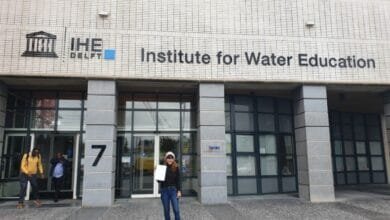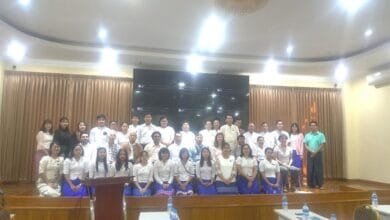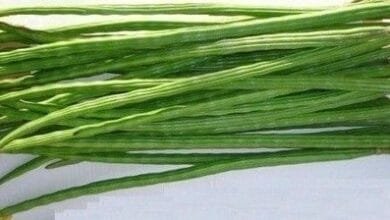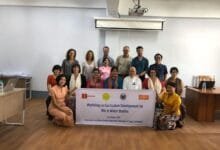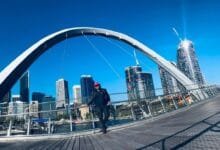
Aye Aye Khaing, an S.A.E from Mandalay City Development Committee
Aye Aye Khaing is a Sub Assistant Engineer (S.A.E) at Water & Sanitation Department under Mandalay City Development Committee since 2012 and her core task is at the Procurement and Maintenance Section. She attended the International Executive Master programme (Management of Urban Water Supply and Sanitation Services) at Agroparistech. We interviewed about her experiences of the master programme, knowledge upon the urban water management, her opinion on the importance of valuing water and capacity building in the water sector.
“Water is tricky”
In 2011, for her thesis of Master in Civil Engineering at Technological University Mandalay, Aye Aye Khaing designed an underground water storage tank with thesis title named “Structure Design of an Underground Water Storage Tank-Building in the Central-Business District Area of Mandalay City”. For this title, she designed a 10 million gallon of underground water storage tank (350′ – 0″ x 250′ – 0″ x 27′ – 0″) and during the process; she realized the complexity and trickiness of the characteristics of water and desired to become a skillful person in handling the water issues. She then gradually became enthusiastic in water resources management and sanitation field. She attended JICA training for non-revenue water management (Leakage control) in Fukuoka, Japan in 2016. She has got quite an extensive knowledge in Piping Engineering and Geotechnical Engineering and also actively participated and delivered in a lot of Water & Sanitation related oral presentations, seminars, workshops and training.
“Sometimes you have to choose between two opportunities”
 Aye Aye Khaing, an S.A.E from Mandalay City Development Committee
Aye Aye Khaing, an S.A.E from Mandalay City Development Committee
She had reached quite a certain extent in accomplishing her Ph.D. degree at Mandalay Technological University when she got the opportunity to attend the International Executive Master programme (Management of Urban Water Supply and Sanitation Services) at Agroparistech. She had been researching about “Sediment Transport Control System in Ayeyarwady River near Mandalay Reach” during her Ph.D and hence, she was indecisive to choose between those two.Through her contemplation, she realized that her visions are to promote capacity building, to improve international experiences, and to manage her responsibilities and accountabilities systematically. She also believed that the improvement of water and wastewater management is a key challenge for local development and welfare of citizens. Thus, she decided to attend this master course which she thought would be more favorable to be applied in the Water & Sanitation Department she has been currently working. Moreover, she genuinely hoped that she would be well-developed in leadership skills and be able to contribute technologies and knowhow to the younger generations after the programme.
“Try your utmost if you don’t meet the criteria”
She had faced many difficulties in applying this master degree as she didn’t meet the criteria of experience level (need at least 12 years, but she had only 7 years), position level (need to be a staff officer, but she was a deputy staff officer), and finally, the age limit. Thus, in preparation of the reports and interview for the master course, she had to emphasize and express her passion in water management – how she defines water management, and to what extent she had been learnt about it; especially during an hour-long oral interview by the jury of Agroparistech after the pre-selection for nominee. Along with her endeavor, she got more confidence in realizing what she wants and committed to try her best to be able to attend the master course.
“Experiences are like hoarded gold”
In the master programme, there was a total of 44 students mainly working in urban water and sanitation services from different countries. It was a sandwich programme which includes:
- Seven months training periods in Montpellier, France,
- Two study trips in the respective country of origin, and
- Three-week case studies in Singapore and Cambodia.
 Master students at Agroparistech
Master students at Agroparistech
The programme has a wide range of courses including; Strategic planning, Leadership Management, Cost management, NRW/Sanitation Management, Customer Management, Contractual engineering, Governance of cities and megacities, etc. During the time in the respective country of origin, the students had to collect the necessary information and data to prepare the strategic planning report. After each phase, they had to carry out oral defenses and submit the reports, so, there was a total of three reports overall. With her continuous efforts, she had great progress and accomplishment throughout all the report writings and oral defenses.”The experiences of the site visits to Marseille and Aix en Provence in Europe, one-week field trip in Singapore – management training in NUS, and two weeks case studies in Cambodia are also invaluable for me,” Aye Aye Khaing enthusiastically explained about her experiences of the master programme.
“The more I work, the more grateful I am”
She had to manage a public toilet construction project for the first time after the master course. She was worried because of the time limit, location limit and budget restrictions, but she carried out the project based on what she had learnt from the master course – set the priorities and implement accordingly with the workflow. After a considerable duration, the outputs and results she got from the project were quite great that she couldn’t even believe herself. “The more I work, the more I am grateful for the knowledge and experiences I had learnt” she added.
“Imagine yourself as a head of a company/ organization in water management”
To understand clearly about the sense of water management, she imagined herself as a head of a company or organization and consider about the following things;
- Organization & structure – what kind of sections (eg. estimate section, survey section, etc) must be implemented indeed within the organization and which must not, to strengthen the organization
- Human resource – how to allocate the right person at the right place, how to uplift the staffs’ motivation, and how to implement the incentives and remuneration plans
- Finance – what are the sources of financial income, how to ensure water business with acceptable water tariff structure as worldwide situation, how to manage the repayment of international loans, and how to set up the income-outcome statement of department
- Customer management – how to access the demand of the public, how to fulfill the customer satisfaction not only by quality but also by quantity, how to get trust from customers, and how to improve the customer information and relations
- Technical – how to function and provide required services, how to improve the technical failures in existing water supply network, how to allocate effectively the available water sources, and how to implement the low-cost & high-impact actions
 Presentation of Strategic Action Plan (V-2) at Agroparistech
Presentation of Strategic Action Plan (V-2) at Agroparistech
She also explained that from her perspective, a master plan of 10 years is the optimum duration for every project with quick-win, short-term, middle-term and long-term actions. So, it needs to consider what to plan and implement within 10 years for sustainable improvement. These commitments must be evaluated annually with specific indicators to adequate monitoring and reporting systems.In order to fulfill SDGs Target 6.1, water utilities play a vital role to achieve universal and equitable access to safe and affordable drinking water for all in 2016-2030. Strategic Action Plan is the bridge to transform current situation of the utility into well-improved one within a specific time frame. Her Strategic Action Plan Report is intended to reach the services of the Water & Sanitation Department into Well Performing Utility in 2030. In her final report version-3, she did her best by applying the above concepts and got the recognition remark from her board of juries that “The merit from the juries”.
“If we don’t know the true value of water, water will show the value itself”
“Here in Myanmar, we consider ourselves as youngsters until 30, but, in other countries, they have learnt and trained many things to a certain extent. Hence, I want the younger generations to be passionate about water, to know its true value and learn more about it to conserve and manage well. Although water is a renewable energy, we must value it. If we don’t know the true value of water, water will show the value itself, and then, we will have to suffer from its consequences. Moreover, compared with the other sectors, I feel like the water sector still has fewer job opportunities, and hence, I hope for the younger generation to have more opportunities to implement their skills and knowledge in the water sector,” she concluded considering the optimistic vision of the future.

 Students of Agroparistech’s Executive Masters’ Programme
Students of Agroparistech’s Executive Masters’ Programme
By Thinzar Mon | Myanmar Water Portal



